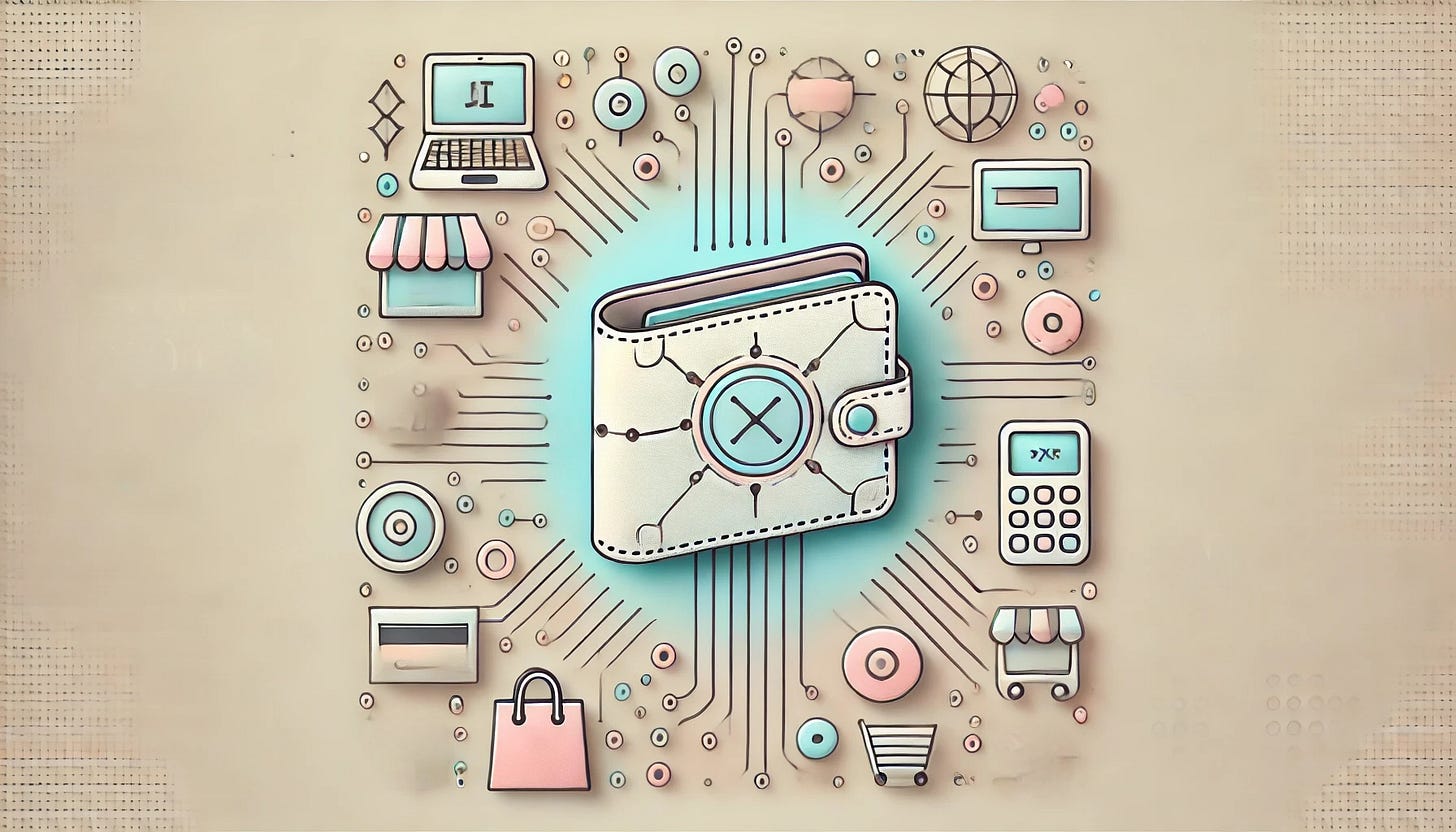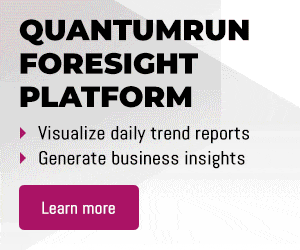The Futures - No. 75
AI-enabled digital wallets / The escalating resource wars / The white-collar recession
In this issue
The Quantumrun team shares actionable trend insights about how AI is making digital wallets smart, the green economy driving global resource wars, the US’ white-collar recession, and Hollywood embracing AI.
Future signals to watch
The US’ hiring surge of 2021 has reversed as economic demand stabilizes, leading to a sharp decline in job postings for white-collar roles like software development. This white-collar recession is partly due to over-hiring during the recovery phase, especially in tech, driven by overly optimistic business outlooks.
Ukrainian developers' Fury ground robot engaged in and reportedly won its first major battle in Russia’s Kursk Oblast four months after its unveiling.
Ireland is leading efforts to develop a trans-Atlantic renewable electricity link aimed at bolstering NATO members' energy security, despite its military neutrality.
Researchers have stored the human genome on a 5D memory crystal, offering a potential blueprint for reviving humanity or preserving endangered species' genomes for billions of years.
South Korean researchers have developed transparent solar cells that can directly charge batteries from glass surfaces, enabling energy generation from devices like smartphone screens, car windows, and building facades.
Researchers have genetically engineered lettuce to enhance its beta-carotene content, promoting better vision, immune function, and protection against diseases like Alzheimer's and cancer.
MIT researchers have developed a more practical HIV vaccination approach, achieving strong immune responses with just two doses, overcoming the virus' rapid mutation challenge.
Hollywood studio Lionsgate partnered with AI research company Runway to develop an exclusive AI model for generating "cinematic video" based on its film and TV portfolio. This approach aims to cut production costs significantly by replacing traditional artists in production tasks like storyboarding.
Forward this email to a friend and help The Futures reach a wider audience :)
Culturally // Trending
YouTube → Marvel Studios’ Thunderbolts // X → Getting comfortable // Reddit → The trains in Finland // TikTok → Resortcore // Instagram → Crocs’ new sneakers // Spotify → “Dancing in the Flames”
💳 Smart wallets could personalize e-commerce
AI-powered “smart wallets,” such as Apple Pay and WeChat Pay, could shift their role from mere payment tools to central e-commerce hubs. According to ARK Invest, digital wallets currently account for 50% of global e-commerce purchases, but with advancements in AI, this share could rise to 72% by 2030.

For example, Klarna’s AI-powered shopping assistant helps users effortlessly navigate through millions of products across multiple marketplaces, offering personalized recommendations based on their preferences. It can quickly compare prices, delivery options, and product features, making it an ideal tool for finding the best deals tailored to each shopper’s needs. When integrated into smart wallets, these shopping assistants can complete the purchase as well. This shift is driven by consumer demand for convenience, especially as 80% of online shoppers rely on saved payment credentials, according to a PYMNTS survey.
Big Tech firms like Apple, Google, and Meta are racing to dominate this evolving space. They’re starting to integrate AI and blockchain technologies into their digital wallets to enhance consumer experiences and prepare for the future of virtual economies. Google Pay, for instance, allows users to manage financial transactions across different services. Meanwhile, Meta envisions a wallet-centric economy in its upcoming metaverse, where virtual currencies and non-fungible tokens could become standard payment methods.
As digital wallets evolve, consumers may depend less on traditional retail platforms, while businesses will need to adapt to AI-led purchases. For industries like futures prop firms, which are deeply integrated with financial technologies, the growth of blockchain-enabled digital wallets will allow faster settlement times, better risk management, and the ability to trade virtual assets. Meta’s integration of cryptocurrencies into its wallet highlights how Big Tech could redefine transactions in both real and virtual worlds, potentially expanding these opportunities further.
Actionable trend insights as digital wallets integrate AI features:
For entrepreneurs
Entrepreneurs could develop a physical, AI-enhanced personal finance assistant, integrating smart wallets into physical objects like wearable devices. These wearables could use voice commands or biometric inputs to provide users with real-time financial advice, budget alerts, or purchase recommendations, acting as an extension of the digital wallet.
They could establish AI-driven smart wallet marketplaces tailored to niche communities or industries.
For example, a platform that integrates AI-powered smart wallets for eco-conscious consumers could automatically analyze the environmental impact of purchases, suggest greener alternatives, and even offer rewards or cashback on sustainable products.
For corporate innovators
Retailers and consumer goods companies could partner with AI-integrated digital wallet providers to create customized loyalty programs. These firms could further develop physical "smart kiosks" in stores that sync with customers' AI-powered wallets, delivering personalized in-store experiences through targeted recommendations and digital coupons.
Financial institutions and payment processing companies could capitalize on AI-enhanced wallets by developing partnerships to offer financial literacy and investment tools tailored to micro-investors.
For example, corporations could use AI to analyze consumer spending and suggest micro-investments in real-time, directly from the wallet, allowing users to round up purchases and invest spare change in curated portfolios.
For public sector innovators
Governments could develop partnerships with fintech companies to launch AI-integrated smart wallet systems that streamline social welfare distribution.
For example, AI could assess recipients' spending behaviors and provide optimized budgeting recommendations, ensuring that funds are spent efficiently on necessities.
Municipalities could introduce smart wallet-based payment systems for public transportation, where AI dynamically adjusts fares based on a commuter’s travel history and environmental impact. These wallets could recommend cost-saving routes or sustainable transport options, encouraging greener commuting habits.
Trending research reports from the World Wide Web
The Economist explains why the world needs to take Sudan’s civil war seriously.
AI tools are boosting productivity and satisfaction for desk workers who use them, but the majority still haven't adopted AI at work, with many lacking company guidelines for its use.
The 2024 World Nuclear Industry Status Report shows solar PV capacity now outpaces nuclear energy nearly fivefold.
Global tech hiring has surged, with cities outside the US like Beijing, Delhi, and emerging markets such as Bucharest and Nairobi now surpassing traditional American tech hubs in workforce size.
Global emissions may have reached a turning point, with 2024 marking the start of a decline driven by renewable energy growth, electric vehicle adoption, and China's leadership in emissions reduction.
🪨 The Green Economy is fueling resource wars
The push for a green economy, driven by the shift to renewable energy and electric vehicles, has sparked a race for critical minerals like copper, cobalt, and lithium. These materials are essential for various technologies, such as electric vehicle batteries and wind turbines. However, as the demand for these metals surges, so do conflicts over their extraction and control. In South Africa, heavily armed gangs are targetting copper—this includes stripping public infrastructure of copper components, crippling the nation's power grid, and leading to violent clashes.
This intensifying competition for minerals is largely driven by a global energy transition, with countries like the US and China vying for control of supply chains. The Democratic Republic of the Congo (DRC), a country rich in minerals such as cobalt and copper, has been a focal point of this competition. The DRC’s Kamoa-Kakula mine, a joint venture between Chinese companies produces more than 300,000 tons of copper annually. Despite the wealth extracted from the land, much of the population remains impoverished, surviving on less than $3 a day, while foreign corporations profit.
These resource wars could worsen geopolitical tensions as nations scramble to secure critical materials. The US, for instance, has enacted tariffs on Chinese minerals like steel, aluminum, lithium, and graphite. The US is also investing heavily in AI technology to boost its domestic mining capabilities. AI is being used to analyze vast data sets, helping locate mineral-rich areas more efficiently, though its effectiveness is still under review.

Actionable trend insights as the Green Economy drive resource wars:
For entrepreneurs
Entrepreneurs can innovate within the mining industry by creating equipment and techniques that reduce environmental damage from mineral extraction.
For example, designing modular, mobile units that use bio-leaching (using bacteria to extract metals) can make small-scale mining less invasive, particularly in fragile ecosystems like the Amazon or Congo basin.
Start-ups can focus on recovering critical minerals like copper, cobalt, and lithium from electronic waste (e-waste). They could establish urban mining operations in major cities, offering services to recycle old electronics and extract valuable materials.
For corporate innovators
Companies involved in manufacturing electric vehicles or renewable energy equipment can establish partnerships with blockchain technology providers to ensure mineral traceability throughout the supply chain.
For example, a car manufacturer could work with mining companies and blockchain firms to create a transparent ledger showing the ethical sourcing of cobalt and lithium.
Energy storage or electric vehicle industries can accelerate research into batteries that use alternative materials to cobalt and lithium, such as sodium-ion or solid-state batteries.
For example, launching a pilot program for electric buses powered by sodium-ion batteries in developing markets could reduce pressure on global supply chains and prevent future conflicts over rare materials.
For public sector innovators
Governments in resource-rich countries can form mineral-sharing alliances with nations that have advanced technologies but lack natural resources.
For instance, the Democratic Republic of the Congo could enter into long-term agreements with countries like South Korea or Japan to trade copper and cobalt for infrastructure, technology and manufacturing expertise.
They can establish rare mineral recycling centers in major metropolitan areas to reduce the pressure on virgin resource extraction. By passing regulations that mandate companies in the renewable energy and electronics sectors to recycle a certain percentage of materials, nations can create a circular economy for minerals.
Outside curiosities
The superhero culture has made fan conventions lucrative for movie stars.
This fancy Singapore condo has its own funicular lift.
Uber has introduced a verification feature that allows passengers to display a blue "Verified" rider badge on trip requests.
The entire board of DNA testing company 23andMe resigned, putting the company’s survival in question.
Not sure if you should buy that outfit? Walmart’s Shop with Friends app allows you to assemble a virtual fitting room to share with your friends.
More from Quantumrun
Read more daily trend reporting on Quantumrun.com
Become a premium newsletter subscriber and get a free one-year subscription to the Quantumrun Trends Platform.
Corporate readers can review our Trend Intelligence Platform
Email us at contact@quantumrun.com with questions or feedback.
Finally, share your thoughts in the Substack comments below. We love hearing from you!
Interested in collaborating with the Quantumrun Foresight team? Learn more about us here.
See you in The Futures,
Quantumrun







How might Hollywood's embrace of AI reshape the entertainment industry, and what challenges could arise in terms of creativity, intellectual property, and the role of human artists?